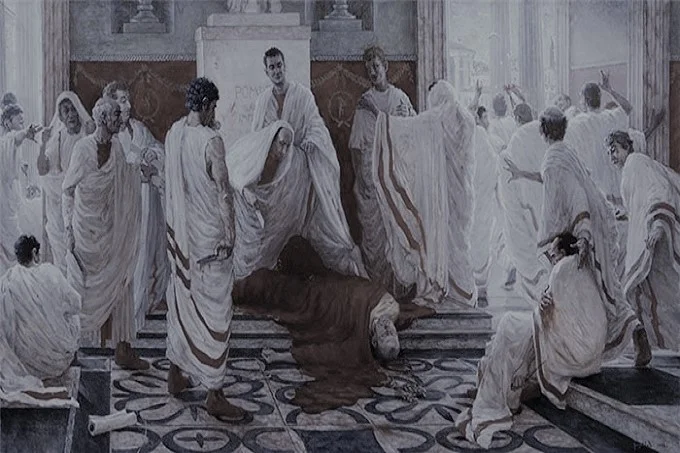What truly occurred on the ides of March, how Caesar was put to death

Ides of March of 44 BC! Julius Caesar, ancient Rome’s most powerful ruler, arrives late for a Senate meeting. Senators surround him and knife him 23 times as he arrives. For ages, the story of Caesar’s assassination has been recounted and rewritten, but the facts are stranger than fiction. What Happened on the Ides of March? And why do we keep telling this story? When historians discuss the assassination of this great man, what do they leave out?
March 15th was a significant occasion in ancient Rome, and these days were known as the Ides of March. The priests were constantly aware that these were perilous times, since calamities and public unrest were more likely to occur during this time. Caesar, the greatest of rulers, dictator, superb commander, and brilliant orator, was assassinated on this day. Many of the world’s monarchs were punished as a result of the Ides of March’s tragic symbolism.
Gaius Julius Caesar was a member of the Julians’ old aristocratic line. At first, he did not stick out among the hundreds of Roman nobility. Minor religious postings stopped him, and he fought in Asia Minor and Greece. The young guy was well-educated, intelligent, and politically astute. During Rome’s civil war between Lucius Sulla and Gaius Marius, Caesar obviously supported Sulla. Gaius Marius was constantly raised by the winner, who made him Supreme Pontiff, the highest ecclesiastical office in the state.
Caesar was always triumphant in life, and he was unconcerned by political intrigues. Gaius joined the First Triumvirate after the victorious Spanish battle against the barbarians. Caesar started to dominate the expanding Roman Empire with the help of two of the time’s most powerful generals, Gnaeus Pompeius Magnus (Pompey) and Marcus Licinius Crassus. Caesar’s superbly executed military operations helped him grow. He conspired with Licinius to destroy Gnaeus Pompey, shattering his realm and claiming it for himself. Later, Caesar deposed Licinius, consolidating power in his own hands.
Caesar became a true celebrity in ancient Rome: his friends looked up to him, the people adored him, and the soldiers worshiped him! Caesar was the first Roman Emperor whose likeness was depicted on coinage. During Caesar’s rule, the popularity of “bread and circuses” among the populace was simply out of control. Many people think of the Roman emperor as brutal, but justice must be done. For example, when the Egyptians brought the head of Pompey’s Gnaeus in response to Caesar’s request, the Emperor wept – he admired Pompey and did not want him to die. Then he ordered his opponent’s executioners to be executed.
Historical sources depict yet another fascinating tale. The Roman legionnaires battled nonstop for many years. They wanted to return home, so Caesar set out to conquer Africa. The troops started a riot and refused to follow the leaders, making the situation at the military camp perilous and crucial. Caesar himself suddenly emerged. He inquired as to what the legionnaires wanted. They began shouting that they wanted to retire and return to their homes. “So get your resignation, countrymen,” the monarch responded calmly. Caesar just turned and went away.
The stunned warriors, battle-hardened soldiers numbering in the thousands… cried. From a deep sense of animosity. Caesar referred to them as “citizens”, not “comrades-in-arms,” or “warriors.” They had devolved into mere citizens in his sight. A delegation was sent right away, in which the soldiers begged for forgiveness and pledged their allegiance to Caesar in exchange for his continuing to see them as companions in arms. The Emperor kindly accepted the apologies, and the military campaign proceeded with success.
Some could call it a ruse, but the most significant thing about Caesar is that he attracted people for entirely other purposes. He just understood how to express his feelings. Caesar always treated people with respect and never showed disdain, unlike many kings. He was a powerful orator and a compelling leader. The Emperor was not without a sense of humor. When his army’s standard-bearer left the battlefield in terror, Gaius seized his shoulders, turned him around, and showed him where he was fleeing, exclaiming, “the enemy is there!” These words swept through the warriors like a bucket of ice water. The objective has been met: the troops’ morale has been boosted, and victory has been secured.
Caesar is also responsible for the Julian calendar that we use today. July is also known as Emperor’s Month, which pleased the Senate since the dictator’s birthday fell in this month. Caesar had a lot of adversaries and individuals who were jealous of him. Caesar’s companions recommended that he employ a guard on many occasions, but he refused. It’s better to die once than to live in fear of death, he said.
Many accounts, notably the historian Plutarch, claim that the prophet forewarned Caesar of the dangers of his death. Shakespeare vividly illustrated this in his drama “Julius Caesar,” coining the term “Beware of the March Idols!” The haughty Emperor disregarded the warning and was brutally murdered by the conspirators at a Senate meeting.
The reality is that Rome had a republican government in place from the 4th century BC. Rome’s final ruler, Lucius Tarquinius Superbus, was deposed, and democracy triumphed. However, when borders became wider, this system of administration proved unworkable. The Roman Empire became too big. The people will never be able to control the empire that Rome has grown into. Caesar was doomed to be the first to lay the republic to rest. He possessed the authority of an emperor, but he wasn’t one. Gaius Julius Caesar built an empire that lasted over 400 years.
Gaius Julius died as a result of the senators’ effort to reestablish the republic. A large number of senators were engaged in the plot. Junius Brutus was convinced to join the plot by the conspirators. Caesar treated Junius as if he were a son, with much compassion and care. Some have speculated that Junius was Caesar’s illegitimate son by Servilia, a lady Caesar adored. Plutarch, a historian, wrote about it.
This outlines the events surrounding Caesar’s death. The conspirators formed a ring around his chair as he entered the Senate. By removing the Emperor’s toga, Lucius Tillius Cimber alerted them. The senators who were plotting against Caesar took their swords and started to hit him. The first to strike was Publius Servilius Casca. Caesar remained unfazed, and he reached for his sword’s hilt, preparing to snare it and strike back. Casca shouted for assistance. Others swooped down on the monarch. They were terrified and started to crush one another, causing more harm than the despised despot. What held the stubborn despot back at a time when he, an experienced warrior, had a chance of dying in unequal conflict or even surviving death?
Gaius Julius’ eyes were drawn to Junius Brutus, who drew his sword in an uncomfortable motion. With the words “And you, child?” Caesar transformed his countenance and draped a toga over his head, putting an end to all opposition. Only one of the 23 knife wounds inflicted on the king of Rome proved deadly for him – the treachery of a man he called a son, whom he cared for and loved. Caesar did not die right away; he died after a time.
The Republican conspirators did not get what they so vehemently wanted with his death. The people were angry, so were the soldiers, and the senators who were against him rallied around Caesar’s grandnephew, Gaius Octavian. He took his name, received most of his inheritance, and became the first emperor. A Second Triumvirate was created to fight the conspirators, which included Mark Antony and Lepidus. They massacred all those who had participated in Caesar’s assassination. At the same time, they killed their rivals and enemies. Even those who escaped all died afterward.
Caesar was a great man, a legendary ruler for the entire era. His influence and authority had a tremendous impact on so many rulers and politicians. Many want to be like him, but Caesar is one of a kind. The Emperor’s expressions are still alive today and have become catchphrases. We have all used them ourselves more than once. “Let the die be cast”, “Crossing the Rubicon”, “Caesar’s wife must be above suspicion”, “I came, I saw, I conquered” (Veni, vidi, vici), and many others.
Shakespeare wrote well of Caesar’s death in the words of Mark Antony: “O justice! Thou art in the beastly bosom, men have lost their minds. Pardon; for Caesar’s heart has gone to the grave. Let us wait for it to return.”



